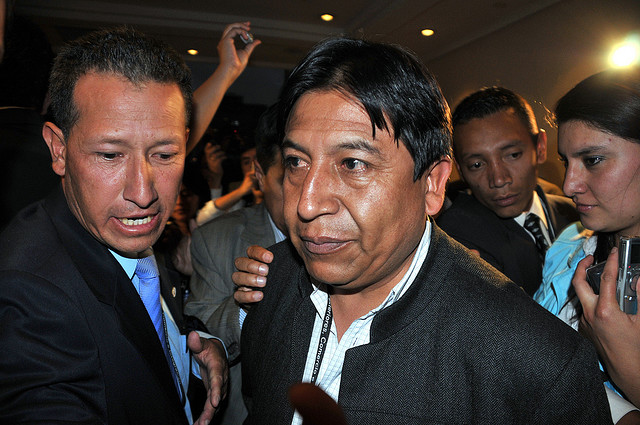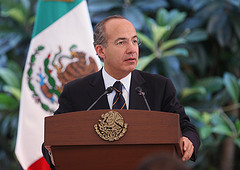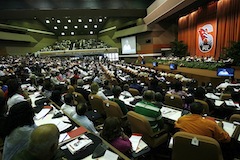
Blog, Cuba, Videos
Raúl Castro’s Speech At Cuba’s Sixth Communist Party Congress
April 17, 2011 By Staff
Undoubtedly, the ration book and its removal spurred most of the contributions of the participants in the debates, and it is only natural. Two generations of Cubans have spent their lives under this rationing system that, despite its harmful egalitarian quality, has for four decades ensured every citizen access to basic food at highly subsidized derisory prices.
This distribution mechanism introduced in times of shortages during the 1960s, in the interest of providing equal protection to our people from those involved in speculation and hoarding with a lucrative spirit, has become in the course of the years an intolerable burden to the economy and discouraged work, in addition to eliciting various types of transgressions.
Since the ration book is designed to provide equal coverage to 11 million Cubans, there are more than a few examples of absurdities such as allocating a quota of coffee to the newborn. The same happened with cigarettes until September 2010 as they were supplied to smokers and non-smokers alike thus fostering the expansion of that unsafe habit in the population.
Regarding this sensitive issue, the span of opinions is very broad, from those who suggest dismissing it right away to others who categorically oppose its removal and propose to ration everything, the industrial goods included. Others are of the view that in order to successfully prevent hoarding and ensure everybody’s access to basic foods, it would be necessary, in a first stage, to keep the products rationed even if no longer subsidized. Quite a few have recommended depriving of the ration book those who neither study nor work or advised that the people with higher incomes relinquish that system voluntarily.
Certainly, the use of the ration book to distribute the basic foods, which was justified under concrete historic circumstances, has remained with us for too long even when it contradicts the substance of the distribution principle that should characterize Socialism, that is, “From each in accordance with his ability and to each in accordance with his labor,” and this situation should be resolved.
In this connection, it seems appropriate to recall what comrade Fidel indicated in his Central Report to the First Party Congress on December 17, 1975: “There is no doubt that in the organization of our economy we have erred on the side of idealism and sometimes even ignored the reality of the objective economic laws we should comply with.”
The problem we are facing has nothing to do with concepts, but rather with how to do it, when to do it, and at what pace. The removal of the ration book is not an end in itself, and it should not be perceived as an isolated decision but rather as one of the first indispensible measures aimed at the eradication of the deep distortions affecting the operation of the economy and society as a whole.
No member of the leadership of this country in their right mind would think of removing that system by decree, all at once, before creating the proper conditions to do so, which means undertaking other transformations of the Economic Model with a view to increasing labor efficiency and productivity in order to guarantee stable levels of production and supplies of basic goods and services accessible to all citizens but no longer subsidized.
Of course, this issue is closely related to pricing and to the establishment of a single currency, as well as to wages and to the “reversed pyramid” phenomenon which as spelled out at the Parliament last December 18, is expressed in the mismatch between salaries and the ranking or importance of the work performed. These problems came up often in the contributions made by the citizens.
In Cuba, under socialism, there will never be space for “shock therapies” that go against the neediest, who have traditionally been the staunchest supporters of the Revolution; as opposed to the packages of measures frequently applied on orders of the International Monetary Fund and other international economic organizations to the detriment of the Third World peoples and, lately enforced in the highly developed nations where students’ and workers’ demonstrations are violently suppressed.
The Revolution will not leave any Cuban helpless. The social welfare system is being reorganized to ensure a rational and deferential support to those who really need it. Instead of massively subsidizing products as we do now, we shall gradually provide for those people lacking other support.
This principle is absolutely valid for the restructuring of the work force, –an ongoing process– streamlining the bloated payrolls in the public sector on the basis of a strict assessment of the workers’ demonstrated capacity. This process will continue slowly but uninterruptedly, its pace determined by our capacity to create the necessary conditions for its full implementation.
Other elements will have an impact on this process, including the expansion and easing of labor in the non-public sector. This modality of employment that over 200 thousand Cubans have adopted from October last year until today –twice as many as before– make up an alternative endorsed by the current legislation, therefore, it should enlist the support, assistance and protection of the officials at all levels while demanding strict adherence to the ensuing obligations, including tax payment.






2 Comments
[…] made the comments during a two-and-a-half-hour speech to inaugurate Cuba’s Sixth Communist Party Congress, the first such meeting the island has seen for 14 years. Castro convened the Congress to discuss […]
[…] Latin America News Dispatch, Apr 22, 2011 – […]
Comments are closed.